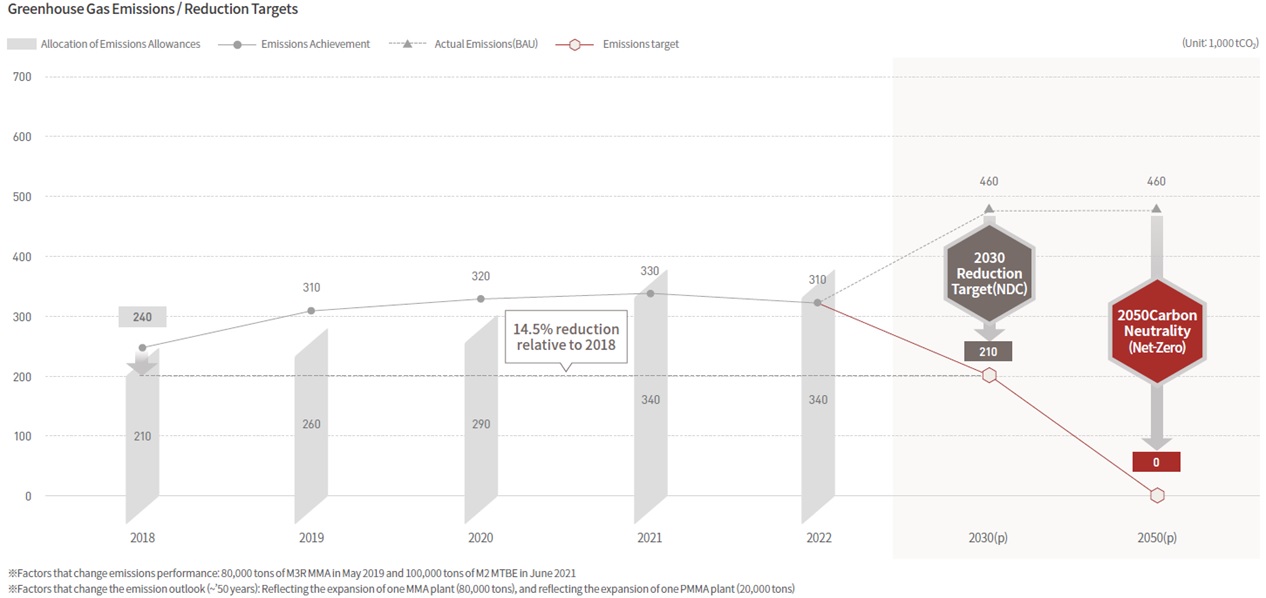Climate Action
LX MMA plans to reduce its emissions by 11.4% compared to 2018, in accordance with the 2030 Nationally Determined Contribution (NDC) for the industrial sector. We have also established and are executing a medium- to long-term roadmap, to achieve Net Zero by 2050. In the short term, we are carrying out various activities to reduce our emissions by improving our energy efficiency and process efficiency. In the medium to long term, we will spare no efforts to mitigate our greenhouse gas (GHG) emissions and achieve Net Zero, by advancing our use of technologies such as the application of Carbon Capture, Utilization and Storage (CCUS) technologies and the adoption of renewable energy sources.
According to the United Nations Framework Convention on Climate Change, Korea enacted and implemented the Act on the Allocation and Trading of Greenhouse Gas Emission Permits in 2015. LX MMA also participates in the trading of GHG allowances, and faithfully carries out our obligations in the emissions trading scheme as prescribed by the law. Our direct and indirect GHG emissions (Scope 1 and 2) are managed on a company-wide scale, while at key business sites including the Seoul Office, the MMA and PMMA plants in Yeosu, and the Technology Research Center in Daejeon, we measure the GHG emissions and energy usage, as well as managing these emission facilities. Furthermore, in order to identify and manage our GHG emissions more accurately, data is compiled on a monthly basis and is subject to a third-party verification.
LX MMA has established our 2050 Net Zero Roadmap and adopted several GHG emissions mitigation activities and technologies in an effort to reduce emissions. Through various emissions reduction activities, including replacing deteriorated facilities in plants with high-efficiency facilities and replacing the lighting with LED lights, we have been able to mitigate our GHG emissions. As a result, we were successful in selling some of our emissions allowances through the emissions trading scheme in 2021. Moreover, we are reviewing ways to mitigate the carbon emissions for each factor in our processes, by identifying the carbon emissions per product group through life cycle assessments (LCA). Hereafter, LX MMA will promote a spectrum of GHG emissions reduction activities, including developing products based on LCA, adopting biofuels, and expanding the use of renewable energy, to contribute to achieving the 2030 NDC and to take the lead in creating a sustainable world for future generations.
 2050 Net Zero Road-Map
2050 Net Zero Road-Map

LX MMA recognizes that a company’s management of its energy usage and the improvement of its efficiency are the most important factors for acting on climate change and reducing its environmental impact. For that reason, we include our performance on energy savings in our company-wide environment & safety indicator, to evaluate and continue monitoring the energy savings performance of our executive management and key business departments. In addition, we are engaging in several other company-wide efforts to reduce energy usage, including regular energy diagnoses and reviews of each team’s energy saving measures.
LX MMA is working to reduce its steam generation by regularly reviewing measures to optimize our operations, and we are consistently saving energy by employing big data to improve our operational efficiency. Furthermore, with the improvements made in the MMA Plant 3, new energy-saving facilities such as rotational speed controllers for rotating machines will be adopted in other plants. We are continuously examining other pieces of equipment that could also be introduced to improve our energy efficiency.
To actively engage in the Net-Zero carbon emissions efforts for the purpose of reaching Net-Zero national GHG emissions by 2050, LX MMA is conducting detailed discussions on how to participate in the Korean-style RE100. As part of our other efforts to act on climate change, we are considering purchasing green forms of electricity to operate some of our polymer plants, and adoption of a Post-Consumer Recycled (PCR) process – collecting and disassembling products after they are used by customers, reprocessing these raw materials, and using them in the manufacturing process. Our plan is to gradually expand our use of renewable energy by converting the power used for manufacturing PMMA, our core product, to 100% renewable energy by 2030, and by increasing our engagement with green premiums and REC purchases.
